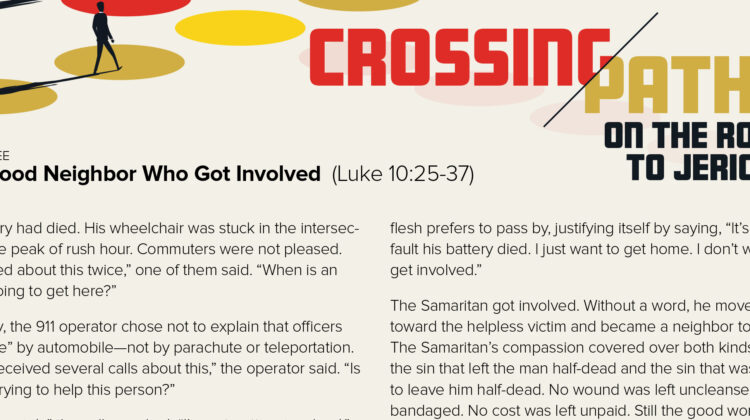
His battery had died. His wheelchair was stuck in the intersection at the peak of rush hour. Commuters were not pleased. “I’ve called about this twice,” one of them said. “When is an officer going to get here?”
Prudently, the 911 operator chose not to explain that officers “get there” by automobile—not by parachute or teleportation. “We’ve received several calls about this,” the operator said. “Is anyone trying to help this person?”
“That’s your job,” the caller replied. “I’m not getting involved.”
The lawyer who tried to test Jesus had failed. He had asked what he had to do to inherit eternal life, only to find out that he hadn’t done it. Love for God and love for one’s neighbor weren’t just a matter of saying the right words. “Do this,” Jesus had said, “and you will live” (Luke 10:28b ESV).
The lawyer, “desiring to justify himself, said to Jesus, ‘And who is my neighbor’” (v. 29)? “After all, Jesus, love must have its limits.” The Parable of the Good Samaritan was the Lord’s reply.
As they walked down the road to Jericho, the priest and the Levite saw the half-dead man and “passed by on the other side” (v. 31b, 32b). Those six English words come from a single word in Greek: one verb of motion with two prefixes attached, highlighting how both men made doubly sure to stay out of the way and not get involved. Maybe they wanted to keep themselves clean for work (see Leviticus 21:1-3). Maybe they didn’t want to end up in the same condition. They certainly didn’t want any inconvenience. So on they went—clean, safe, and justified in their own minds. They had committed no sin against this man. Why should they risk sharing in his misfortune?
Loving our neighbors is not limited to the prohibitions found in Commandments like the Fifth, Seventh, and Eighth. As Luther’s Catechism explains, keeping those Commandments involves the willingness to share in our neighbor’s misfortune, to protect and care for our neighbor’s life, property, and reputation, even if it involves inconvenience or risk. But the sinful flesh prefers to pass by, justifying itself by saying, “It’s not my fault his battery died. I just want to get home. I don’t want to get involved.”
The Samaritan got involved. Without a word, he moved toward the helpless victim and became a neighbor to him. The Samaritan’s compassion covered over both kinds of sin: the sin that left the man half-dead and the sin that was willing to leave him half-dead. No wound was left uncleansed or unbandaged. No cost was left unpaid. Still the good work wasn’t finished—the Samaritan promised to come back and do more!
Your whole head is injured, your whole heart afflicted. From the sole of your foot to the top of your head there is no soundness—only wounds and welts and open sores, not cleansed or bandaged or soothed with oil (Isaiah 1:5b-6 NIV). This is our half-dead state: spiritually dead in sin since conception, waiting for the eternal death we deserve, helpless to save ourselves. Even the best neighbors in this world, willing as they might be to help, are unable to save us.
Only Jesus Christ, the Son of God, was willing to become our Good Neighbor and get involved with us. He touched the man with leprosy before He spoke to him (Mark 1:41). He touched the bier of the widow’s son (Luke 7:14). He took on our flesh and bore our infirmities, griefs, and sins. He suffered and died to pay the cost of our salvation.
The Risen Savior has not only come into our world. He has also come into our hearts by His Holy Spirit, bringing His healing Gospel, which covers over all our sins. Jesus is still willing to share in our misfortunes, and He teaches us to “go and do likewise” for our neighbors (Luke 10:37b). Only by His Spirit do we see our neighbors as they are and love them as God commands. We see their troubles, the chief of which is sin. We see their needs, the chief of which is forgiveness. We don’t pass them by. We get involved.
Good neighbors share the Good News! They “bear one another’s burdens, and so fulfill the law of Christ” (Galatians 6:2).
Rev. Christian Eisenbeis